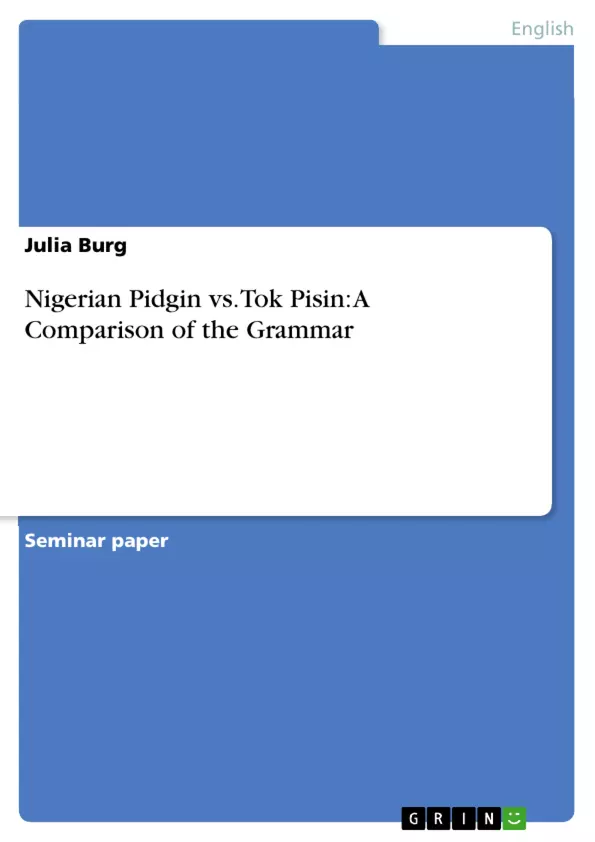1. Introduction
Nigeria and Papua New Guinea are two of many countries which have adopted English as their main language. But having so many other, substrate languages influencing the development of a English-speaking country, two major pidgin languages developed: Nigerian Pidgin and Tok Pisin.
If one wants to compare these two pidgins with each other, it seems almost inevitable to consider their great geographical distance as well as their historical differences.
But my intent in this work is not to elaborate on the status and function and development of the two pidgins but on their differences in grammar. Therefore I’ll mainly focus on the noun phrase and the verb phrase.
2. Morphology
2.1 Plural marking on nouns in Tok Pisin
The majority of the English based Creole and Pidgin languages both at the Atlantic coast and the South Sea waive marking plurality on nouns or rather use it very optionally. Thus, the same applies to Nigerian Pidgin and Tok Pisin. But if there occurs the need to make a clear distinction between singular and plural both pidgins absolutely dispose of a pluralizer.
In Tok Pisin the most common way to express plurality is by the use of the particle ol, which at the same time is identical to the third person plural pronoun. Ol, clearly derived from the English ‘all’, occurs before the noun as opposed to the post-nominal English plural marking suffix -s.
(1) Mi lukim dok. (2) Mi lukim ol dok.
I saw the dog. I saw the dogs.
(Siegel)
But according to Geoff P. Smith (2002), “ there is a great deal of variability, and the presence or absence of ol is still somewhat unpredictable” (p 66). This can clearly be seen in the following example, in which only one noun takes the pre-nominal ol although both have plural meaning.
(3) Em i stap nau ma(ma) bl’ em wokim spia nau em i kam nau ma bl’ em wokim ol bet.
He stayed, his mother made arrows, he came and his mother made beds.
(Smith 2002: 66)
Although the particle ol is the dominant plural marker, the pluralizing suffix -s “has also become a feature of urban Tok Pisin” (Romaine 1992:219). In order to explain the use of the plural -s, Smith adopts from Romaine “that animacy does have some influence, with a larger proportion of human than animates using the suffix, and that count nouns take -s considerably more often than mass nouns” (p 71). It is also very often found that the plural is doubly marked...
Table of Contents
- Introduction
- Morphology
- Plural marking on nouns in Tok Pisin
- Plural marking on nouns in Nigerian Pidgin
- The pronoun system in Tok Pisin
- The pronoun system in Nigerian Pidgin
- Syntax
- Word order
- Special features of Melanesian Pidgin
- Negation
- Tense, mood and aspect
- Future tense
- Past time reference
- Habitual and continuous aspect
- Perfective aspect
- The particle laik in Tok Pisin
- The pre-verbal come in Nigerian Pidgin
- Modal auxiliaries
- Verb serialization
- Conclusion
Objectives and Key Themes
This work examines the grammatical differences between Nigerian Pidgin and Tok Pisin, focusing on the noun phrase and verb phrase. It explores the historical and geographical factors that influence the development of these languages and aims to provide a comprehensive comparison of their grammatical features.
- Plural marking on nouns
- Pronoun systems
- Word order and syntax
- Tense, mood, and aspect
- Verb serialization
Chapter Summaries
The introduction presents the context of Nigerian Pidgin and Tok Pisin, highlighting their development within English-speaking countries with diverse linguistic influences. The chapter focuses on the distinct grammatical features of each pidgin language, specifically on the noun phrase and the verb phrase.
The morphology chapter examines the marking of plurality on nouns in both pidgins. It explores the use of particles like 'ol' in Tok Pisin and 'dem' in Nigerian Pidgin, highlighting the influence of English and other substrate languages on the pluralization strategies. The chapter further compares the pronoun systems of both languages, noting the greater variety in Tok Pisin and its distinction between inclusive and exclusive forms of the first person plural pronoun.
Keywords
Nigerian Pidgin, Tok Pisin, Pidgin languages, Creole languages, Morphology, Noun phrase, Verb phrase, Plural marking, Pronouns, Syntax, Word order, Tense, Aspect, Verb serialization.
- Quote paper
- Julia Burg (Author), 2006, Nigerian Pidgin vs. Tok Pisin: A Comparison of the Grammar, Munich, GRIN Verlag, https://www.grin.com/document/67700



